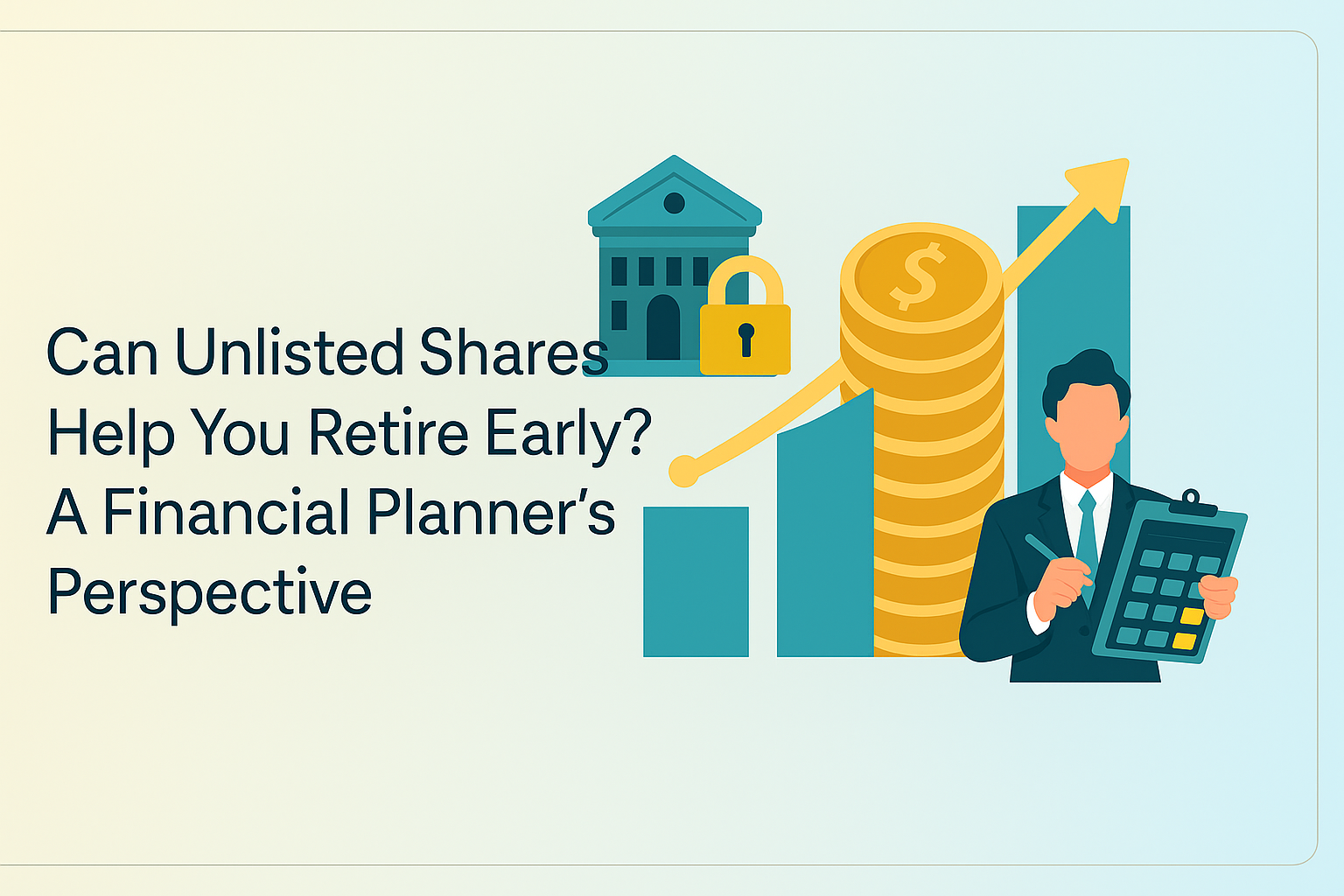The dream of retiring early is a powerful one. Many Indian investors seek ways to accelerate their wealth growth. They want to escape the daily grind sooner. This often leads them to explore investment options beyond the usual stocks, bonds, and fixed deposits.
Among these options, unlisted shares often catch the eye. They promise high returns and access to fast-growing companies before they become household names. But can these private market investments truly be your ticket to an early retirement? Let’s explore this from a financial planner’s point of view.
What Exactly Are Unlisted Shares? A Quick Primer
Think of it this way: when a company’s shares are “listed,” they’re traded openly on a stock exchange like the NSE or BSE. Anyone can buy or sell them during market hours. These are public companies.
Unlisted shares are different. They belong to companies that aren’t yet publicly traded. They’re often startups, growing businesses, or even well-established firms that choose to remain private. You can’t buy or sell them easily on a public exchange.
They’re sometimes called “private equity” or “pre-IPO shares.” Investors get access to these shares through private deals, employee stock option plans (ESOPs), or specialized brokers. The appeal lies in investing in a company’s growth story much earlier.
The Allure of Early Retirement: Is There a Faster Lane?
Many aspiring early retirees look for investments that offer explosive growth. They feel traditional options might not deliver returns quickly enough. Unlisted shares seem to fit this bill perfectly.
Imagine investing in a promising startup that becomes the next big tech giant. Buying its shares at an early stage, when the valuation is lower, could mean multi-bagger returns if it goes public or gets acquired. This potential for significant capital appreciation is what draws many towards the private market.
For some, it’s about getting in on “the ground floor.” It’s about spotting potential before the masses do. This strategy can be tempting if your goal is to build wealth rapidly and achieve financial independence sooner than planned.
The Potential Upside: How Unlisted Shares Could Accelerate Your Retirement
Yes, the growth potential can be huge. If you pick the right company, your investment could multiply many times over. This kind of return is rarely seen in listed markets over short to medium periods. It could significantly boost your retirement corpus.
Unlisted shares also offer diversification. They allow you to invest in sectors or companies not yet available on public exchanges. This can add a unique flavour to your portfolio. It might also reduce overall portfolio volatility if other assets aren’t performing well.
Finally, there’s the chance to invest at a lower valuation. Companies usually go public at a higher valuation. Investing earlier means you could potentially benefit from this price difference once the company lists.
The Real Risks: Why a Financial Planner Advises Caution
As a financial planner, I must stress that high returns come with high risks. Unlisted shares are far from a guaranteed path to early retirement. In fact, they can be a significant hurdle if not approached carefully.
Illiquidity: The Biggest Hurdle for Early Retirement
This is the primary concern. “Illiquidity” means you can’t easily sell your shares when you want to. There’s no open market like the stock exchange where buyers and sellers meet daily. Finding a buyer for your unlisted shares can take months or even years. Sometimes, you might not find one at all.
For early retirement, this is a huge problem. You’ll need access to your funds for living expenses. If a large part of your wealth is locked in illiquid unlisted shares, you could face a cash crunch. Waiting for an IPO or acquisition to exit your investment can be a very long and uncertain game.
Valuation Challenges: Is the Price Right?
How do you know if you’re paying a fair price for an unlisted company? It’s tough. There’s no daily market price. Valuations are often based on private agreements or complex calculations. These might not be fully transparent to the average investor.
This lack of clear pricing increases your risk. You could easily overpay for shares. If the company struggles, the actual worth of your investment could be far less than what you paid.
High Failure Rate of Startups & Private Companies
Many startups and private companies fail. Statistics show that a large percentage of new businesses don’t survive their initial years. If the company you invest in fails, your entire investment could become worthless. This is a complete loss of capital, a scenario you must be prepared for.
Unlike listed companies, private firms face less public scrutiny. They might not have the same level of regulatory oversight. This can lead to information asymmetry, where insiders know more than you do. It makes thorough due diligence challenging for retail investors.
A Financial Planner’s Framework: Integrating Unlisted Shares into Your Early Retirement Strategy (Or Not!)
Given these risks, how should you approach unlisted shares if early retirement is your goal? My advice is to proceed with extreme caution and a clear strategy.
Assessing Your Risk Tolerance & Financial Health
Before even considering unlisted shares, ensure your financial house is in order. Do you have a robust emergency fund? Is your core investment portfolio diversified and stable? Can you truly afford to lose the money you invest in unlisted shares completely?
These investments are only for those with a very high risk tolerance. You must be comfortable with the possibility of a total loss. They should never be funded by money you might need in the near future or for essential expenses.
The “Small Slice” Approach: Strategic Allocation
If you decide to invest, treat unlisted shares as a tiny part of your overall portfolio. We’d typically suggest allocating no more than 5-10% of your total investable assets to such high-risk, illiquid investments. This ensures that a potential loss doesn’t derail your entire early retirement plan.
Think of it as a “booster” rather than the “engine” of your retirement strategy. Your core portfolio of diversified mutual funds, blue-chip stocks, and other stable assets should remain your primary focus. For those interested in exploring how to invest in unlisted companies, understanding the small slice approach is crucial.
Diversification Within the Unlisted Space
Even within the unlisted market, try to diversify. Instead of putting all your eggs in one unlisted company, spread your investment across a few promising ones. This reduces the impact if one company fails. However, finding and researching multiple unlisted opportunities can be time-consuming and difficult.
Long-Term Horizon & Patience is Key
Unlisted investments demand patience. Don’t expect quick returns. The typical holding period for private equity can be 5, 7, or even 10+ years. For a detailed guide on acquiring unlisted shares in India, ensure you factor in this long-term view.
This extended timeline must align with your early retirement goals. If you plan to retire in five years, tying up funds in illiquid assets for a decade isn’t a wise move.
The Role of Professional Due Diligence
Due diligence is critical. For most retail investors, properly vetting an unlisted company is almost impossible. You might not have access to financial statements, management interviews, or industry insights that institutional investors do.
This is where expert advice becomes invaluable. If you decide to pursue this, work with specialized platforms or advisors who can perform the necessary checks. They can help you understand the market, assess the risks, and even understand the process of buying private equity more effectively.
Practical Considerations for Early Retirees (or Aspiring Ones)
If early retirement is your aim, you’ll need a predictable income stream. Unlisted shares offer anything but predictability. Always prioritize building a liquid, diversified portfolio that can sustain your living expenses without needing to sell illiquid assets.
Consider a “bridge fund” strategy. This means having enough liquid assets (like fixed deposits, short-term bonds, or dividend-paying stocks) to cover several years of living expenses. This buffer allows you to weather market downturns and wait for your unlisted investments to mature without financial pressure.
Are There Less Risky Paths to Early Retirement? (A Balanced View)
Absolutely. While unlisted shares offer high-growth potential, many investors achieve early retirement through more traditional, less risky methods. These include:
- Consistent Investing in Diversified Portfolios: Regularly investing in well-diversified mutual funds (equity and debt), index funds, and blue-chip stocks can build substantial wealth over time. Compounding is your best friend.
- Maximizing Savings Rate: Aggressively saving a large portion of your income significantly shortens your retirement timeline.
- Increasing Income: Finding ways to earn more, whether through promotions, side hustles, or upskilling, directly boosts your investment capacity.
- Prudent Expense Management: Living below your means and avoiding unnecessary debt frees up more capital for investment.
These strategies might not be as “exciting” as investing in the next unicorn. But they’re proven, lower-risk paths to financial independence.
The Verdict from Your Financial Planner: Proceed with Extreme Caution & Expert Guidance
Can unlisted shares help you retire early? In very rare, specific circumstances, and for a tiny portion of your portfolio, they *might* contribute to accelerating wealth. However, they’re far from a primary or reliable strategy for most people.
As a financial planner, my advice is to view unlisted shares as a speculative, high-risk gamble. They should only be considered by investors who are already financially secure, have a long investment horizon, and can afford to lose the entire investment without impacting their retirement goals.
For the vast majority of Indian investors, focusing on a disciplined investment approach with diversified, liquid assets will be a much safer and more predictable route to early retirement. Always consult a qualified financial advisor to tailor a strategy that truly aligns with your risk profile and financial goals.
Take the Next Step: Is This Investment Right for You?
Understanding the complexities of unlisted shares and how they fit into your retirement planning requires personalized advice. Don’t make decisions based on hype or FOMO (Fear Of Missing Out). Ready to explore a personalized retirement strategy? **Schedule a consultation with a qualified financial advisor today** to see if unlisted shares fit into *your* plan, or to discover safer, proven paths to financial independence.










